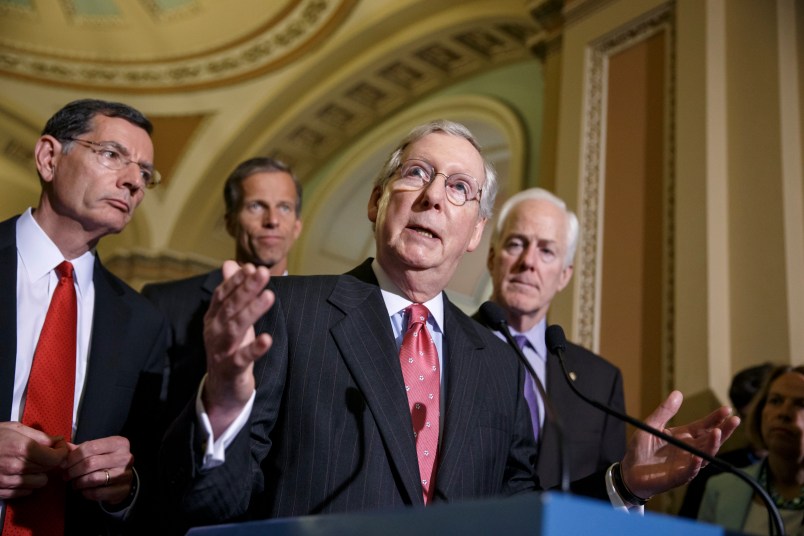In anticipation of becoming the next Senate majority leader in January, Sen. Mitch McConnell (R-KY) opened the door to a legislative attack on Obamacare by bypassing the filibuster and scrapping parts of it with 51 votes.
After McConnell downplayed the prospect of a GOP Senate fully repealing Obamacare on Tuesday, his office told the conservative Washington Examiner on Thursday that he would be willing to use a procedural option known as reconciliation to slice off parts of Obamacare with a simple majority of senators.
“Leader McConnell is and has always been committed to the full repeal of Obamacare, and he’ll continue to lead efforts to repeal and replace it with patient-centered reforms that enable greater choice at lower costs. He knows it won’t be easy, but he also believes that if Republicans are fortunate enough to take back the majority we’ll owe it to the American people to try through votes on full repeal, the bill’s most onerous provisions, and reconciliation,” McConnell spokesman Brian McGuire told the paper.
There’s a catch: reconciliation is only usable for changes to law which affect the budget.
“Reconciliation can only be used for tax/spending items. So yes, FULL repeal (to include items not subject to a reconciliation bill) would require 60. That has always been the case and always been on the table,” Don Stewart, McConnell’s deputy chief of staff, told TPM in an email.
The process is tricky, but it’s doable. The Senate would first have to pass a budget resolution, which also requires 51 votes, and include reconciliation instructions.
One former longtime Senate parliamentarian said a majority leader could make a persuasive case for using reconciliation to repeal core components of Obamacare, many of which have budgetary impacts. That includes the premium tax credits that help lower-income Americans buy insurance. It might even include the individual mandate, given that the Congressional Budget Office has said scrapping the mandate would save money.
“One could argue that a proposal that says no funds shall be used to implement the Affordable Care Act is fit for reconciliation. Doesn’t that save money? That’s certainly a legitimate argument,” said the former parliamentarian, who asked not to be named. “It wouldn’t repeal the ACA but it could starve it to death.”
That sets up tension between the GOP’s establishment wing and the tea party wing. The McConnell-led wing want to repeal smaller items like the medical device tax, which they might have a chance of getting President Obama to sign. Tea party lawmakers want to rile up their base by going big and slashing as much of the law as possible, and daring Obama to veto their bills.
McConnell’s comment earlier in the week on Fox News that “no one thinks” a Republican Senate could pass an Obamacare repeal bill didn’t sit well with some segments on the right. The Senate Conservatives Fund, long a thorn in McConnell’s side, blasted it as “surrender.”
The big question is how far Republican leaders are willing to go, and whether they find the votes in the Senate and House to pass an anti-Obamacare bill and put it on Obama’s desk.
What would likely be off-limits under reconciliation are the regulatory components of Obamacare, such as the insurance market reforms, protections for sick people and rules letting young adults remain on a parent’s policy until they’re 27.
In recent decades, parliamentarians have disagreed as to whether reconciliation can only be used for deficit-reduction measures. But, notably, a parliamentarian at any given moment can be replaced by a Senate majority.
This article has been updated to include more context.







Has Senator Yertle explained yet what arcane Senate trickery he will use to overcome a Presidential Veto, assuming his party even wins control of the chamber?
(D) Kentuckians.
Please vote Tuesday.
Please take another (D) with you to the polls.
Please stop this madman.
jw1
I just wish that whole slate of Mitch the Whore and his Three Johns (Barasshole, Thune and Cornhole) behind him in the stock photo would drive off a cliff.
The past is never dead. It’s not even past. Repealing ACA is the South’s latest zombie battle against the North in a Civil War that ain’t never gonna be over. Sen. Chinless Wonder (R-Closet) tryin’ to maintain his bonafides with the angry white mob will do whatever it takes to appease the nutjobs so he gets to twee in DC with his entourage of queens for six more glorious years.
"That sets up tension between the GOP’s establishment wing and the tea party wing. "
I wish the press would stop claiming there is a difference here.